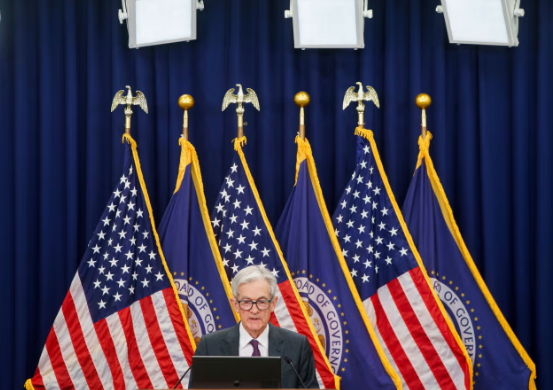
Recently, the three major US stock indices closed lower, with the Dow Jones Industrial Average, Nasdaq Composite, and S&P 500 all experiencing varying degrees of decline. The volatility was triggered by recent comments from Federal Reserve Chairman Powell. While investors widely expected the Fed to cut interest rates as soon as possible to stimulate the economy, Powell explicitly stated that there was "no rush" to cut rates. This stance directly dampened market optimism and triggered a sharp decline in the stock market in late trading.
In his public remarks, Powell reiterated the Fed's "patient" approach, emphasizing that current economic data did not signal an urgent need for a rate cut. He stated that the resilience of the US economy provides room for decision-making, and that while inflation is gradually approaching the 2% target, there will still be fluctuations along the way. This statement directly addressed the market's high expectations for a December rate cut. According to data from the CME FedWatch tool, after Powell's remarks, traders' expectations of a 25 basis point rate cut in December plummeted from 82.5% to 62%, a sudden reversal of market sentiment. On the eve of Powell's speech, the October PPI data released by the US Bureau of Labor Statistics further reinforced his cautious stance. The PPI rose 2.4% year-on-year, while the core PPI rose 3.1%, both exceeding market expectations. This rebound in data heightened market concerns about persistent inflation and suggested the Federal Reserve would be reluctant to significantly adjust interest rates in the near term. Meanwhile, analyst Fawad Razaqzada noted that the S&P 500 index was already overbought, and technical indicators suggested the market could face a correction or consolidation. A combination of factors fueled investor risk aversion, with industry ETFs generally closing lower, with sectors like biotech and healthcare experiencing significant declines. Energy ETFs bucked the trend and rose, reflecting a divergent market outlook.
Adam Hetts, global head of multi-asset at Janus Henderson Investors, characterized Powell's remarks as "hawkish," believing they directly "threw cold water" on overheated market sentiment. While he acknowledged that inflation and the labor market were not currently out of balance, this statement clearly contradicted investors' expectations for looser policies. Melissa Brown of SimCorp warned that growing evidence suggests inflation will persist above the 2% target, adding uncertainty to the Fed's future decisions. Market divergence is reflected not only in the performance of different asset classes but also in the diverging interpretations of the economic outlook by institutions.
Current market uncertainty extends further to the political level. Republican candidate Trump has publicly called for Powell's resignation, while Treasury Secretary Bensoner has maintained a cautious stance, emphasizing policy continuity. The divergence between interest rate markets and forecast markets is becoming increasingly pronounced: forecast markets are betting on an increasing probability of Powell's removal, while interest rate markets maintain cautious expectations for rate cuts based on economic data. Bloomberg strategist Simon White noted that this split reflects the market's differing weighting of politics and economic fundamentals—the former driven by political rhetoric, the latter more reliant on data and policy signals. If Trump successfully pushes through personnel changes, the Fed's decision-making logic could face a restructuring, with profound implications for the stock market.
Powell's latest remarks reveal the Fed's delicate balance between economic growth and inflation control. Investors' eagerness for rate cuts contrasts sharply with policymakers' cautious approach, a divergence directly reflected in stock market volatility. Going forward, the market may need to continue to monitor evolving economic data, the Federal Reserve's internal dynamics, and the dynamics of political power. Against this backdrop, investors should remain vigilant to the potential for heightened volatility. The short-term pressure on the US stock market may be the latest epitome of the tug-of-war between economic policy and market expectations.

The United States announced on Monday its commitment to provide 1.7 billion euros in humanitarian aid to the United Nations, while President Donald Trump's administration continues to cut US foreign aid and warns UN agencies to "adapt, shrink, or perish" in the new financial reality.
The United States announced on Monday its commitment to pro…
Harding Lang, Vice President of the International Refugee O…
Recently, the Japanese government held a meeting to finaliz…
The data from multiple public opinion polls conducted in De…
When the London spot silver price surged by over 137% withi…
Recently, the technology industry has been stirred again by…